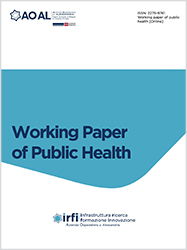Gli effetti psicologici a lungo termine della pandemia da COVID-19 negli operatori ospedalieri in un ospedale del nord Italia

All claims expressed in this article are solely those of the authors and do not necessarily represent those of their affiliated organizations, or those of the publisher, the editors and the reviewers. Any product that may be evaluated in this article or claim that may be made by its manufacturer is not guaranteed or endorsed by the publisher.
Autori
Obiettivi: Lo scopo del presente lavoro è stato quello di esplorare l’impatto psicologico a lungo termine della pandemia da COVID-19 negli operatori sanitari e in altri professionisti che lavorano presso l’Azienza Ospedaliera “SS Antonio e Biagio, e Cesare Arrigo” di Alessandria. Materiali e Metodi: È stato condotto uno studio osservazionale prospettico monocentrico su 112 operatori dell’Azienda Ospedaliera attraverso la somministrazione di un questionario on-line. I dati sono stati raccolti a tra l’1 e il 30 aprile 2021. Il questionario comprendeva un’autovalutazione delle informazioni socio-demografiche, cliniche, lavorative e relative al COVID-19 e la percezione del rischio. Inoltre, includeva la versione on-line di questionari psicologici validati in lingua italiana: Scala dell’impatto dell’Evento-Rivista (IES-R), Scala di Depressione, Ansia e Stress (DASS-21), Insomnia Severity Index (ISI), Coping Orientation to the Problems Experienced - Nuova Versione Italiana (COPE-NVI- 25), e Scala della Qualità di Vita Professionale (ProQOL-5). Risultati: L’analisi dei dati mostra che i lavoratori dell’Azienda Ospedaliera partecipanti allo studio, presentano percentuali moderate di sintomatologia da stress post-traumatico (40,2%), depressiva (40.2%), ansiosa (28.6%), da stress (44.6%) e insonnia (16.1%). La categoria dei lavoratori in ambito amministrativo mostra maggiori sintomi ansiosi e di stress post-traumatico. Le strategie di coping maggiormente utilizzate nel nostro campione sono l’attitudine positiva, l’orientamento al problema e il sostegno sociale. Il sottogruppo di lavoratori a diretto contatto con i pazienti mostra livelli moderati di compassion-satisfaction e bassi livelli di stress traumatico secondario e burn-out. Conclusioni: Dai risultati del presente lavoro si è osservato che gli effetti negativi a livello psicologico si possono mantenere anche nel lungo termine dall’insorgenza della pandemia.
Come citare

Questo volume è pubblicato con la licenza Creative Commons Attribuzione - Non commerciale 4.0 Internazionale.






